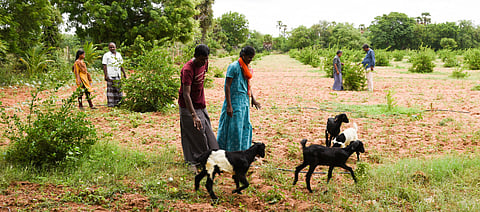

TIRUCHY: A cluster of 24 farmers are now reaping the rewards of an initiative to convert 25 acres of fallow land into fertile land with lemon cultivation in a village near Lalgudi in the district. Due to menace of wild animals from the nearby Thanchankuruchi reserve forest, farmers had left the land, which was accustomed to groundnut and red gram cultivation, idle for more than 25 years.
However, under the Kalaignarin All Village Integrated Agriculture Development Program (KAVIADP), officials of the state agriculture department identified the fallow land and formed a cluster - L Neikuppai Dryland Cluster - with 24 farmers as its members.
Based on a geological survey, the agriculture engineering department installed two bore wells with motors. Pits were also dug up for planting acid lime saplings and a drip irrigation facility was established. Due to the proximity of the cluster to the reserve forest, all farmers opted to plant lime seedlings as thorny plants acted as a deterrent and kept wild animals at bay.
Wild bears, monkeys and peacocks had previously caused damage to all crops once they were cultivated. G Boomi, 32, is one of the members of the cluster who benefited from the initiative. Boomi, a civil engineering graduate, was forced to return to his village during the Covid-19 pandemic. He then joined the cluster and farmed a variety of crops, including bananas and papayas.
Farming significantly increased his income, leading Boomi to focus on agriculture full-time. R Kamalarajan, another cluster member, stated that income from intercropping covers the costs of maintaining the lemon trees until they start bearing fruit.
In accordance with their preference, the horticulture department provided lime seedlings free of cost to farmers, R Sugumar, assistant director of agriculture, who played a key role in the project, told TNIE. "Initially farmers showed little interest. However, after the lime plants grew, we encouraged them to cultivate inter crops to earn extra income and enhance soil fertility," he said.